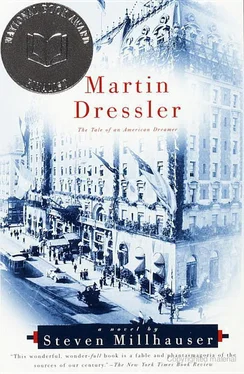“Of course it’s all very well to let Caroline go her own way,” Margaret said one night, while brushing something from the sleeve of her dress. “Especially when her own husband and sister prefer each other’s company.”
Martin felt something burst in his neck. “What the devil is that supposed to mean? Em and I have business to discuss — lots of it. If Caroline showed a second’s worth of interest in all this—”
“Well I just think it’s a shame, that’s all,” Mrs. Vernon said, giving a sigh in the manner of an actress on the melodrama stage as she rose from her seat; and turning to Emmeline she said, “Now don’t stay up late, dear. It’s very bad for your health.”
Martin watched Margaret Vernon walk away and then turned to Emmeline. “What the devil was that all about?”
“I suppose I do monopolize you,” Emmeline said.
“Oh, wonderful. Caroline has no interest in anything that concerns me, but because I’m her husband I’m supposed to prefer her company to yours.”
“It would seem reasonable. Please keep your voice down.”
Martin lowered his voice. “It’s not reasonable. It’s unreasonable. Your mother is being unreasonable. What does she expect me to do? Sit in my parlor all day playing euchre with her and Caroline?”
“Still, I don’t like it when you speak to her like that.”
“And the way she speaks to me? Do you like that? ‘Of course it’s all very well.’ Who the deuce does she think she’s speaking to?”
“Shall we walk?”
A few nights later Margaret Vernon returned to the subject of Caroline. Martin, stiffening, stared straight ahead while he prepared to tamp down his anger, but Margaret Vernon made no effort to suppress her excitement. Looking from one to the other from behind her rapidly fluttering blue-and-green silk fan, she announced that Caroline had found a friend.
“A friend!” said Martin, irritated at the sound of false heartiness in his voice. “And who may that be?”
“You’ll find out soon enough,” Mrs. Vernon somewhat mysteriously replied.
When Mrs. Vernon had left, Martin looked at Emmeline. “What do you make of it?”
“It isn’t as if Caroline doesn’t make friends,” Emmeline said. “She’s actually rather good at it, when she wants to be.”
“Then why doesn’t she ever want to be?”
“Well, she has you.”
Martin looked at her. “Well yes. She does have me. And now she has a new friend.”
“So it would seem.”
“And what does that mean?”
“Oh, nothing. I’ve seen these little friendships of Caroline’s. Shall we walk?”
25. A Fifth Chair at Dinner
CAROLINE’S FRIEND JOINED THEM AT DINNER in the main dining room the following night, and as she sat down Martin realized that he had seen her somewhere in the hotel, a tall, thirtyish woman, though for the life of him he couldn’t recall where. It was Margaret who explained: Claire Moore lived on the sixteenth floor around a bend in the corridor. She was a late riser, like Caroline — or, as Claire Moore herself laughingly put it, like all widows without a guilty conscience — and she had passed Caroline several times in the corridor before introducing herself at the elevator late one morning. The next day she had invited Caroline to her apartment for a cup of tea, and after that it was luncheons, afternoon outings, a great visiting back and forth. And Martin was surprised: he had expected someone proper and boring, someone trained to talk about weather and food and to grow gradually invisible in company, and instead he found himself in the presence of a lively woman with a strong laugh in a strong throat, an air of humorous self-assurance, and a habit of sharp observation. She was handsome in a sudden, erratic way, her face with its strong bones bursting into moments of radiance as her long-fingered hands swept through the air and her eyes glistened with energy. Her hair — Caroline’s hair, he saw immediately — moved when she laughed, and it struck Martin that motion was her element: she darted even as she sat, a bird in flight, a flock of birds. And always she glanced admiringly at Caroline, drew her into the circle of her anecdotes, praised her hair, a ribbon, the color of her clothes; and throwing back her handsome head, she laughed her full laugh, drawing back her lips from her very white teeth and showing the strong column of her trachea against the skin of her throat.
Now every night at dinner a fifth chair sat at Martin’s table, awaiting Claire Moore, who arrived with Caroline a little late, a little breathless, glowing with health as if she had just come from a long brisk walk by the river, and who even as she began to sit was already describing the day’s outing: they had gone shopping for hats, they had gone walking in the park, they had found a simply wonderful little out-of-the-way lunch place with the most imaginative sandwiches, they had braved the crowds of a tremendous tearoom that seated seven hundred. Think of it: seven hundred! Caro had been a brick — a brick, really — and she had seen the glorious humor of it: seven hundred ladies in a department store, taking tea. For the joke of it was of course that tea was an intimate occasion, which had been spread out and extended until it was like — well — as she had remarked to Caro at the time — it was like rowing in a boat the size of a barge. Here Martin begged to disagree. He himself found nothing humorous about sheer size, which on the contrary produced a sensation of power, of majesty — had anyone ever laughed at the Brooklyn Bridge? But of course he understood she wasn’t referring to size alone, but to a special development that he himself had given some thought to: the expansion of small private events into large public ones. A family hotel was a perfect example. Here the guest willingly gave up certain privacies, such as that of dining alone, in exchange for the convenience of public service. And in doing so, an entirely new idea was born: the large public dining room, which wasn’t a grotesque, bloated version of an intimate family dining room, but something entirely new, something massive and modern, and no more comic than an El track or a twenty-story office building or a transatlantic steamer.
Martin, surprised by his little outburst, was gratified and at the same time oddly irritated by the sudden serious attention with which Claire Moore listened to his words; and when he stopped speaking she struck her hands together, shook back her hair, and looking Martin directly in the eye said she would certainly think twice before daring to attack a tearoom again.
Martin wasn’t sure what to make of this powerful, laughing woman, who had taken up with Caroline and suddenly was there, at dinner, inescapably. She whisked Caroline from one shop to another and reported tirelessly the slightest incident of their daily adventures, suffusing every small thing with the drama of her temperament, while Caroline seemed uplifted on the waves of Claire Moore’s unremitting attention.
“I don’t know what to make of her,” he said to Emmeline as they strolled along a secluded path in the underground courtyard.
“I don’t like it,” Emmeline said.
“It?”
“This sudden friendship. Her attachment to Caroline — her attachment to us. She herself—” Here Emmeline gave a shrug.
“She seems fond of Caroline. I can’t imagine what they talk about.”
“Oh, she’s probably fond of her, in a way. Caroline draws people. She doesn’t need to say much. You see how they are at dinner.”
“I think I like her. She’s good for Caroline. She gets her out.”
“It won’t end well,” Emmeline said.
The friends, Margaret Vernon reported, had become inseparable, simply inseparable. They visited back and forth a hundred times a day, they attended afternoon performances at the Black Rose or the New Lyceum, when they weren’t going off on one of Claire Moore’s thousand little excursions. It was the best thing in the world for Caroline, who needed nothing but a little encouragement before she warmed to people; it was so good for her to get out of herself, to say nothing of getting out of her apartment. She simply adored the theater. And Claire was a good friend; you could tell she cared about Caroline, asking her opinion about things, admiring her, worrying when Caroline was out of sorts. Martin, watching the friendship out of the corner of his eye, was certain of only one thing: Claire Moore was most definitely there, occupying the fifth chair at dinner, a powerful and laughing woman. She was attentive to Caroline, praised her repeatedly, though not quite as often as at first, reported their little adventures, drew Caroline skillfully into the circle of her talk, which would widen suddenly to include Martin and Emmeline and Margaret, rippled with words and laughter; and from time to time, in response to a witty turn of phrase, Caroline would lightly smile.
Читать дальше












